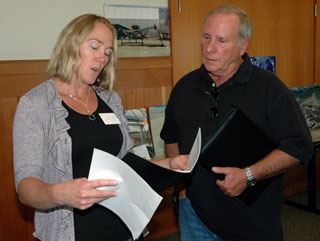EVERETT — Cedar Grove Composting’s representatives had planned on addressing specific issues at its Sept. 14 public information event, but they found themselves responding to different concerns voiced by citizens of Marysville and Everett who attended the event at the Everett Station.
Cedar Grove set up tables in the Weyerhaeuser Room summarizing Cedar Grove’s history and compositing procedures, as well as its plans to turn their composting facility on Smith Island in Everett into a “green energy campus,” but what area residents who attended the meeting asked the most questions about was what could be done to stop the smell that they believe is coming from the Smith Island facility.
“This is a great presentation, and I’m sure that nobody here has any problem with composting,” said Ron Kirkpatrick, a resident of Marysville. “It’s the odor that bothers us.”
Susan Thoman, director of marketing and business development for Cedar Grove Composting, responded to Kirkpatrick’s concerns about the Smith Island facility by inviting him and other members of the general public to sign up for tours of the facility, where they could see its operations for themselves and have their questions answered by those who work on site.
Jo Newland, a resident of north Everett, echoed Kirkpatrick’s belief that the Smith Island facility has already exceeded its capacity due to the growth of Marysville and Everett.
“We have no objections to what you do, but why not move?” Newland said. “You’re looking to expand your operations in an area that’s already so small. Everything you’ve said about what you do is wonderful — just move it.”
Betty Campbell, who lives on Third Street in Marysville likewise emphasized her support of composting and recycling, but with her home “right in the path of the odor,” she asked Cedar Grove to eliminate all odors coming from their Smith Island facility. Thoman responded by encouraging area residents to report any incidents of odor at their homes or places of work to “independent odor specialists” contracted by the company, who can be reached at 425-299-1300 or 206-406-4586.
“We’d like you to be a good neighbor,” said Marysville resident Byron Mack, who reported that the odor had come on strong when he left his house at 4:20 p.m. to attend the meeting.
“We want to be a good neighbor, because we intend to be here for a good long while,” said Laird Harris, of Harris & Smith Public Affairs, speaking on behalf of Cedar Grove. Harris suggested a possible series of public meetings to follow.
Wayne Wright, market sector leader for water and natural resources with GeoEngineers, explained that the plans to turn the Smith Island facility into a green energy campus will include wetlands mitigation, by creating new wetlands to compensate for the wetlands that will be eliminated as a result of development on site. he added that Cedar Grove has worked with area tribes and state and federal governmental agencies to negotiate the mitigations.
Lawrence Klein, technology development manager for Cedar Grove, elaborated that a green energy campus at Smith Island could create as many as 10 million kilowatt-hours of electricity, or enough to power approximately 400 homes year-round. If approved, Cedar Grove’s permit application to the Army Corps of Engineers would not, by itself, allow the company to expand its composting on Smith Island beyond its currently permitted limits.
No one at the meeting could offer a definitive timeline for how long the process of turning the Smith Island facility into a green energy campus might take, especially given that additional permits, environmental reviews and periods of public comment would be required for expansions of the facility or its recycling operations.
When Newland expressed concerns about possible health risks posed by the odor, Harris responded by citing studies conducted by Cornell University which showed no ill effects on the health of workers involved in composting operations.
“I can understand if people are still nauseated by certain smells, but when it comes to how it acts on people’s health, the evidence is clear that it doesn’t,” Harris said.
Newland suggested that such workers become desensitized to the smell. He also blamed the odor for driving down the value of her property, in excess of the decline due to the economy.
“We have so many houses up for sale that their owners have started to rent them out, because they can’t sell them,” said Pam Davis, a fellow resident of north Everett. “If it was a timber smell, I could live with it.”
While area residents such as Norm Nicholson of east Marysville joined others in commending Cedar Grove for its composting and recycling even as they objected to its odor, Marysville’s Eric Peterson was the lone homeowner at the meeting to state that he didn’t mind the smell, which he deemed no worse than what he’d grown up with on a farm.
“This is about jobs,” Peterson said, after Thoman noted that Cedar Grove employs 22 Marysville residents and 14 Everett residents. “This is about not paying extra for trash. These complaints are going to hit you in your wallets, and the alternative is a landfill.”
“We don’t want to back away from criticism,” Harris said at the end of the meeting. “We regard this meeting as a positive step forward.”



